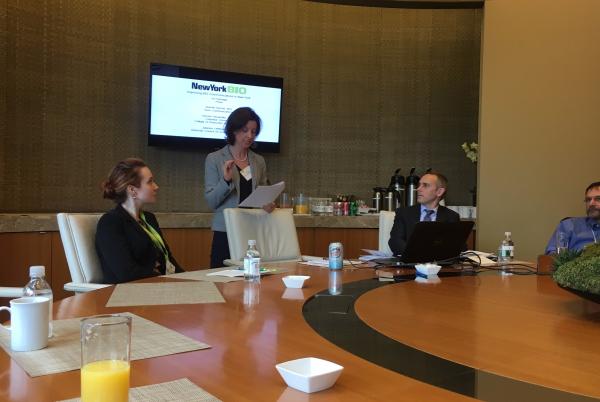
I was thrilled to be included in the NewYorkBIO 2017 Annual Conference last week - at the Time Warner Center in Columbus Circle - to conduct a panel on the topic of science communication. (1)
The mission of NewYorkBIO is to advocate for the bioscience industry in New York state, across multiple areas including companies, universities, research institutions, and others dedicated to advancing life science research and commercialization.
The NewYorkBIO Annual Conference brings together emerging and established companies, investors, business development professionals, scientists and others supporting and advancing life science discoveries. The full agenda of last week's conference can be found here.
My goal in organizing this panel was, above all, to bring different voices from diverse realms of science to the table. I did not want four people from industry or four academics sharing their own struggles in science communication within their own silo. Rather, I sought out four people from four very different worlds of science who have one thing in common - we are all incredibly passionate and dedicated to communicating science and breaking down the barriers between what is going on at the lab bench and what the public understands.
Our goal was to share a bit about what we do, what we have learned along the way, what works and what doesn’t work and ultimately, to think about improvements that can be made in this field going forward.
To bring a perspective from industry, we were fortunate to have Ed Harnaga, the Vice President of Corporate Affairs at Pfizer, join us. Ed has over 25 years in corporate communications - primarily in the life sciences and healthcare. In his most recent role at Pfizer he leads the Corporate Reputation and Policy communications programming and also serves as the communications lead for Pfizer’s Worldwide R&D organization.
Jennifer Barrett joined us to discuss to world of communications from the side of an experienced health communication professional dedicated to improving health outcomes. Jennifer holds a Master of Science in Health Communication from Boston University and is a Program Director and Director of Business Development at AXON Communications.
Dr. Vincent Racaniello, the Higgins Professor of Microbiology & Immunology at Columbia University Medical School who has been researching virology for over 35 years, joined our panel to represent academia. Vincent values and is incredibly dedicated and committed to scientific communication. Following on his belief that scientists must communicate their work to the public, he has co-authored a virology textbook, teaches virology, distributes videocasts of his lectures online, writes a blog about viruses, and produces podcasts on viruses, parasites, and bacteria.
As a team, we brought our own challenges to the table, citing certain shared hurdles such as the paucity of communication training for scientists, lack of resources and support from institutions, and the general nature of scientists being stretched too thin to take the time to communicate.
We shared the feeling that communication in science is highly valued, but, under-appreciated. Dr. Racaniello, for example, spends his own time and energy producing his podcasts as a team of one person. He has not received funding for his work, nor been recognized by the university. However, he continues on, motivated by his own internal drive to better the public's understanding of viruses.
Following an engaging conversation with participants from the audience, we left excited to work together towards a common goal. We need to motivate more scientists to join in our fight to improve communication and we will keep working to do so.
Notes:
(1) Many thanks to the New York Bio committee for selecting our topic as a session and for giving us the time to discuss a topic that we all consider to be incredibly important.



